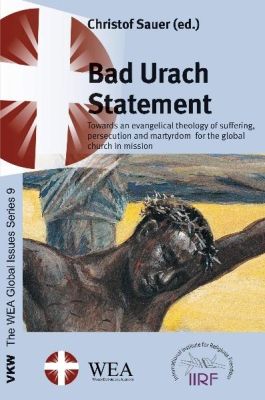Wir verwenden Cookies, um Ihre Erfahrung zu verbessern. Um die neuen Datenschutzrichtlinien zu erfüllen, müssen wir Sie um Ihre Zustimmung für Cookies fragen. Weitere Informationen
Bad Urach Statement
Towards an evangelical theology of suffering ...
There is an urgent need for a deeper evangelical understanding of the theology of the cross with regard to suffering, persecution and martyrdom for Christ and its relevance for the global church in mission. Therefore 24 participants from at least 18 different countries of origin and residence met from 16 to 18 September 2009 in Bad Urach, Germany, for a consultation on “Developing an evangelical theology of suffering, persecution and martyrdom for the global church in mission”. This was …
10,00 €
Eventuell nicht lagernd - wir versuchen schnell zu besorgen
Alle Preise inkl. MwSt.
Artikelnummer:
540062000
EAN/ISBN:
9783862690626
Produktart:
Bücher
Einband:
Paperback
Maße:
14 x 21 cm
Umfang:
92 S.
Veröffentlichungsdatum:
18.04.2013
There is an urgent need for a deeper evangelical understanding of the theology of the cross with regard to suffering, persecution and martyrdom for Christ and its relevance for the global church in mission. Therefore 24 participants from at least 18 different countries of origin and residence met from 16 to 18 September 2009 in Bad Urach, Germany, for a consultation on “Developing an evangelical theology of suffering, persecution and martyrdom for the global church in mission”. This was organized by the International Institute for Religious Freedom, sponsored by the World Evangelical Alliance Religious Liberty Commission, together with the Theological Commission and Mission Commission, and the Lausanne Theological Working Group in preparation towards the Third Lausanne Congress on World Evangelization, Cape Town 2010. As an outcome of their consultation the participants sent a message in October 2010 to the whole body of Christ and to their fellow evangelicals in particular, the Bad Urach Statement. It comes from some of those evangelicals from different parts of the globe and various contexts who have possibly most advanced in formulating an evangelical theology of suffering, persecution and martyrdom. It is not addressed from “the West” to “the rest”, or “from traditional sending countries” to “mission fields”, nor from the “non-persecuted” to the “persecuted”. It has rather been designed by evangelicals from contexts with various levels of persecution reading the Bible together, sharing their own contextually relevant theologies, and considering some of Christian theology and tradition together. A short popularized summary of some of the points, entitled The Bad Urach Call, is also reproduced in this volume.

